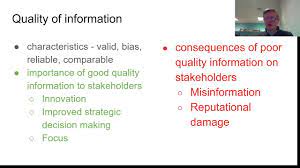
The Essence of Quality Information
In today’s digital age, where information is abundant and easily accessible, the importance of quality information cannot be overstated. Quality information is like a beacon in the sea of data, guiding us towards knowledge that is accurate, reliable, and valuable.
What Defines Quality Information?
Quality information is characterised by several key attributes:
- Accuracy: Reliable information that is factually correct and free from errors or bias.
- Relevance: Information that is pertinent to the topic at hand and addresses the needs and interests of the audience.
- Credibility: Information from trustworthy sources that have a reputation for reliability and expertise in their field.
- Clarity: Information presented in a clear, concise manner that is easy to understand and digest.
- Timeliness: Information that is up-to-date and reflects the most current developments or research findings.
The Impact of Quality Information
Quality information serves as the foundation for informed decision-making, critical thinking, and knowledge acquisition. It empowers individuals to make educated choices, enhances learning experiences, and fosters intellectual growth. In a world where misinformation and fake news abound, quality information acts as a shield against deception and manipulation.
Seeking Out Quality Information
In our quest for quality information, it is essential to be discerning consumers. We should verify sources, cross-check facts, and critically evaluate the credibility of the information we encounter. By engaging with reputable sources, staying curious, and being open-minded to diverse perspectives, we can enrich our understanding of the world around us.
In Conclusion
Quality information is not just data; it is knowledge distilled into its purest form. It enlightens minds, broadens horizons, and fuels progress in society. As we navigate through the vast landscape of digital content, let us uphold the value of quality information as a cornerstone of learning and growth.
Essential Insights into Quality Information: Understanding, Identifying, and Utilising Credible Data for Informed Decision-Making
- What is quality information and why is it important?
- How can I determine if information is of high quality?
- Where can I find reliable sources of information?
- Why is accuracy crucial when evaluating the quality of information?
- How does quality information contribute to informed decision-making?
What is quality information and why is it important?
Quality information is the bedrock of knowledge and understanding in any field. It encompasses data that is accurate, relevant, credible, clear, and timely. Quality information is crucial because it serves as a reliable guide for decision-making, problem-solving, and learning. By providing trustworthy insights and facts, quality information empowers individuals to make informed choices, fosters critical thinking skills, and guards against misinformation. In an era inundated with data overload and fake news, the importance of quality information cannot be overstated as it forms the basis for a well-informed society built on truth and integrity.
How can I determine if information is of high quality?
Determining the quality of information is a crucial skill in today’s information age. To assess whether information is of high quality, one must consider various factors such as the credibility of the source, the accuracy of the content, the relevance to the topic at hand, and the timeliness of the information. It is essential to verify the credentials of the author or publisher, cross-reference data with reputable sources, and critically evaluate any potential biases or conflicts of interest. Additionally, examining the currency of the information and assessing whether it aligns with current knowledge and research can help in determining its quality. By employing a critical eye and being discerning consumers of information, individuals can better navigate the vast sea of data and distinguish between reliable, high-quality information and misinformation.
Where can I find reliable sources of information?
When seeking reliable sources of information, it is essential to look beyond the surface and delve into the credibility and expertise of the content providers. Trusted sources can be found in reputable publications, academic journals, government websites, and established organisations within specific fields. Additionally, fact-checking websites and libraries can serve as valuable resources for verifying the accuracy of information. By critically evaluating the authority, objectivity, and currency of sources, individuals can navigate the vast sea of information with confidence and discernment.
Why is accuracy crucial when evaluating the quality of information?
Accuracy is paramount when assessing the quality of information due to its foundational role in ensuring reliability and credibility. Inaccurate information can lead to misconceptions, misinterpretations, and ultimately, misguided decisions. By prioritising accuracy in our evaluation of information, we uphold the integrity of knowledge dissemination and safeguard against the propagation of falsehoods. A commitment to accuracy not only enhances the trustworthiness of information but also cultivates a culture of critical thinking and informed discourse, essential for navigating the complex landscape of data and ideas in today’s interconnected world.
How does quality information contribute to informed decision-making?
Quality information plays a pivotal role in informed decision-making by providing individuals with reliable and accurate data that forms the basis of their choices. When faced with complex decisions, having access to high-quality information allows individuals to weigh the pros and cons, evaluate different perspectives, and anticipate potential outcomes more effectively. By relying on credible sources and up-to-date information, individuals can make informed decisions that align with their goals, values, and needs, ultimately leading to more successful and satisfying outcomes.






